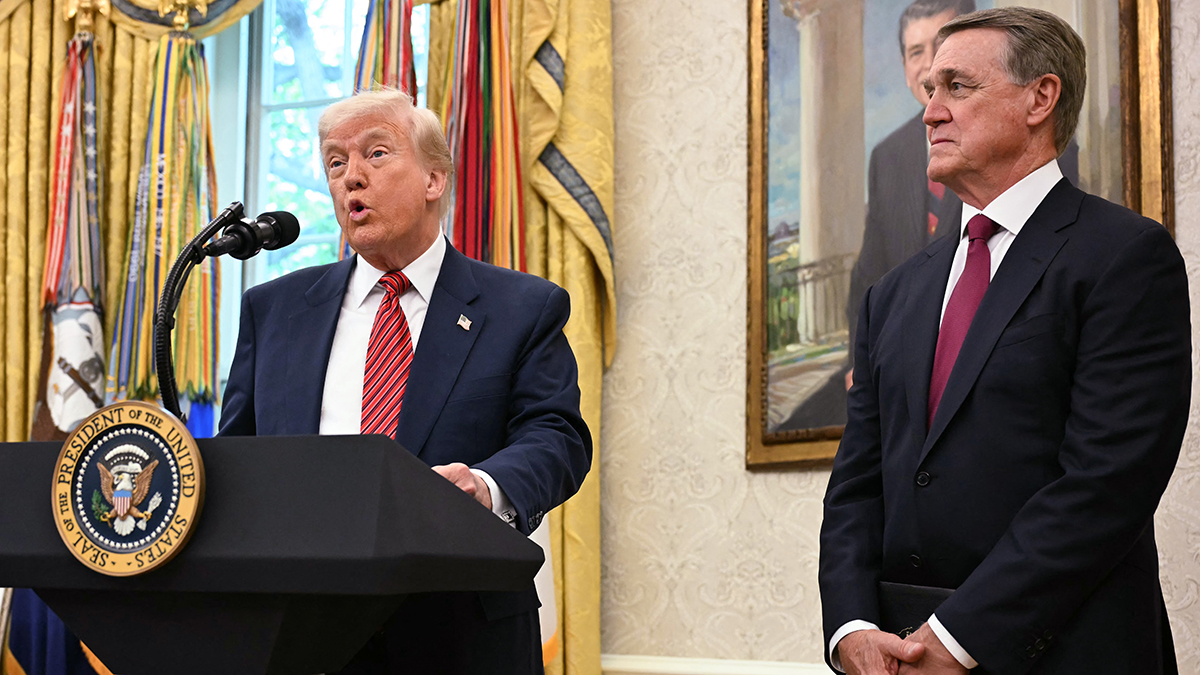President Donald Trump is having more success getting judges confirmed than Democrat Barack Obama did at this early stage in their presidencies, and that disparity is expected to increase this week as the GOP-led Senate pushes through more of Trump's choices.
Majority Leader Mitch McConnell, R-Ky., has set the stage for votes on four of the president's appellate court nominees and one district court nominee starting Monday night. In doing so, he declared that Democrats would be unsuccessful in stopping their confirmation.
"We'll confirm all of them this week, no matter how long that takes," McConnell said.
McConnell's frustration stems from Democratic insistence on using all the time Senate rules allow for moving to an up-or-down vote on the nominee. It also ignores the many ways Republicans blocked Obama's choices, most notably the Democratic president's nomination of Merrick Garland to the Supreme Court. Republicans refused to even hold a hearing on Garland, insisting in February 2016 that the president chosen months later in November should fill the court vacancy.
Republican senators also blocked 18 Obama nominees by refusing to sign off on a so-called blue slip, thus signaling their opposition. Democrats became so frustrated with the use of the filibuster to block Obama's court nominees that they voted in 2013 to lower the threshold for overcoming the filibuster from 60 votes to a simple majority. Republicans expanded the threshold covering district and appellate court judges to Supreme Court nominations earlier this year in response to Democratic opposition to Trump's pick of Neil Gorsuch for the high court.
"It's incredibly rich that Republicans are now accusing the Democrats of obstructionism," said Daniel Goldberg, legal director at the Alliance For Justice, a liberal judicial advocacy group.
Trump has had nine federal judges confirmed so far, including Gorsuch and four circuit court judges. In comparison, Obama had five judges confirmed at this stage of his presidency, including Supreme Court Justice Sonia Sotomayor and one appellate court judge.
U.S. & World
The day's top national and international news.
Obama got off to a much slower start in nominating judges than Trump has. Obama had nominated one Supreme Court justice and 24 appellate and district court nominees at this stage compared to one Supreme Court justice and 57 appellate and district court nominees for Trump.
Still, conservatives have been frustrated with the pace in the Republican-controlled Senate and blamed McConnell. The Judicial Crisis Network threatened to run ads against McConnell but backed off after winning assurances from the Kentucky Republican that the pace will quicken.
More than legislation, filling lifetime posts on the courts is a presidential legacy that reverberates for decades.
President Ronald Reagan secured the most judicial confirmations among the recent two-term presidents with 402. President Bill Clinton secured 387 judicial appointments, followed by George W. Bush at 340, and Obama at 334, according to statistics maintained by the Administrative Office of the U.S. Courts
The Senate, on a vote of 84-10 Monday night, confirmed Trevor McFadden of Virginia, a deputy assistant attorney general in the Justice Department, to serve as a district judge. The Senate also voted mostly along party lines to move ahead on the nomination of Notre Dame law professor Amy Coney Barrett to serve on the U.S. Court of Appeals for the 7th Circuit.
"We are having to spend 30 hours on the cloture of a district judge," complained Sen. Mike Enzi, R-Wyo. "I have been here 21 years now, and I have never heard of that. We have to get the appointments through. That is one of our prime jobs, to provide advice and consent for the president, and it is not happening on a timely basis."
Senate Minority Leader Chuck Schumer, D-N.Y., said Republicans were rushing through judges who only recently passed the Senate Judiciary Committee. He said the Senate has traditionally given members not on the committee more time to evaluate nominees and questioned the reasoning behind not doing so now.
"One can argue it's because the Republican agenda has been such a failure in this Congress the leader has chosen to try and accomplish through the courts what Republicans have been unable to achieve through the legislative process," Schumer said.
Conservative groups are pushing hard for Barrett's confirmation, and criticized Democrats for questioning whether her Catholic beliefs would influence her legal decisions. The U.S. Conference of Catholic Bishops said the challenge to Barrett was a painful reminder of a time when "anti-Catholic bigotry did distort our laws and civil order."
California Sen. Dianne Feinstein, the top Democrat on the Judicial Committee, said Barrett had no experience as a judge and worked on only one trial before becoming a professor. She rejected the notion that she was applying a religious test in her questioning of Barrett, saying, "I think that has been exaggerated out of any reality."
But Sen. Chuck Grassley, the Republican chairman of the Judiciary Committee, disagreed.
"Some of the comments and questions from my Democratic colleagues crossed the line," Grassley said at a news conference at the Capitol on Monday.
McConnell also moved to limit debate on Michigan Supreme Court Justice Joan Larsen to serve as a circuit judge, along with Colorado Supreme Court Justice Allison Eid and University of Pennsylvania law professor Stephanos Bibas. Larsen and Eid were on the short list of candidates for the Supreme Court that Trump released last year on his way to winning the GOP nomination for president.



